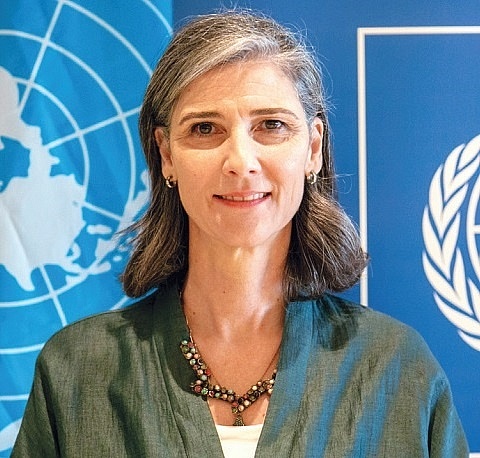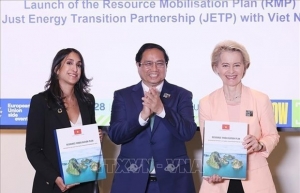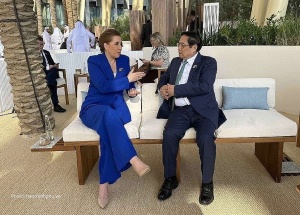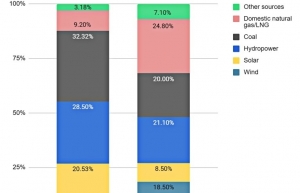JETP a crucial step for Vietnam’s climate ambitions
Now is an important moment to take a step back and reflect on what is actually meant by the ‘just’ in a just energy transition, and how it can best be realised.
 |
| Ramla Khalidi - Resident representative in Vietnam United Nations Development Programme |
There are many dimensions to the partnership. The first, and most obvious, is the commitment to mobilise financial resources to facilitate Vietnam’s emissions reductions from transformation in the energy sector. Seen in this way, the JETP is a down-payment intended to produce catalytic investments in low-carbon energy, policy reform, research and development, and the creation of decent jobs and training opportunities. These efforts will accelerate Vietnam’s pathway towards the long-term objectives of the Paris Agreement.
The second dimension concerns burden-sharing. Who will shoulder the costs of the energy transition? There is no realistic road to net-zero that does not include an elimination of fossil fuel subsidies. This implies higher electricity and petrol prices for consumers, at least during the transition period.
Crucial to the implementation of the political declaration on JETP, the Vietnamese government must design mechanisms to ensure that access to electricity remains affordable and reliable, especially for low-income households and other vulnerable groups.
The third dimension refers to emphasising local value chains and local economic development. Let us take the example of Halong Bay in the northeastern province of Quang Ninh. Many of us know this iconic site for the thousands of towering limestone islets. Very few know that Quang Ninh is also home to Vietnam’s largest coal reserves.
As the world grapples with the urgent need to reduce carbon emissions, the question we must ask is: what does the energy transition mean for the people of Quang Ninh, and others like them whose lives and livelihoods are tied to the coal mines and power stations?
The fourth dimension involves the buy-in and support of all relevant stakeholders. These include, but are not limited to, affected workers, local communities reliant on carbon-intensive industries, low-income communities and marginalised groups, non-governmental organisations and mass organisations, environmental organisations, renewable energy developers, labour unions, and governments and policymakers.
By securing broad social consensus in the form of regular consultation, participation and feedback mechanisms, stakeholders gain the opportunity to voice their concerns, foster trust, and feel ownership over the transition process. Their diversified and specialised knowledge then paves a pathway for early identification of potential negative impacts, in turn enabling more adaptable and responsive mitigations.
In Quang Ninh, the just transition represents an opportunity to safeguard the pristine beauty of Halong Bay for generations to come. But it also means much more than that. It means cleaner air, healthier lives, and a thriving tourism industry today and in the future that relies on the bay’s preservation.
It is also a chance to reorient the local workforce and economy through decent employment and capacity building by providing constituents with improved community wellbeing, green skills, and sustainable, decent job opportunities in renewable energy, ecotourism, and other green sectors.
Here in Vietnam, the government has embarked on a journey to green the energy mix, reducing its heavy dependence on coal. The commitment to renewable energy sources like wind and solar is profound.
That said, there are still many obstacles along the path to net-zero. At the global level, developed countries must fulfill their obligations to mobilise and provide climate finance for developing countries to implement climate action with transparency.
In Vietnam, the JETP is a crucial step towards fulfilling national climate targets, but it only represents one aspect of the work required to keep the country on track. We are working with the government and other stakeholders to promote a just transition framework through an inclusive and consultative process. The proposed framework will not only identify negative social, economic, and environmental impacts, along with the actions to address them, but will also highlight ways in which affected people and vulnerable groups will be able to benefit from the new opportunities the energy transition will bring.
At the local level, this framework would also enable a community-centred approach, ensuring that projects will not only provide benefits in the form of mitigated economic and residual risks, but also enhance opportunities beyond existing social and environmental safeguards.
Realising the power of green technologies, long-term planning, and worker empowerment will require strong support from everyone. Together, we can make this transition equitable, sustainable, and beneficial for all.
 | Vietnam launches Resource Mobilisation Plan for Just Energy Transition Partnership During the World Leaders Summit at COP28 on December 1, Vietnamese Prime Minister Pham Minh Chinh launched the Resource Mobilisation Plan (RMP), which marks a key milestone towards the implementation of the Just Energy Transition Partnership. |
 | Vietnam and Denmark key climate partners: COP28 In light of a green strategic partnership between Denmark and Vietnam established in November, the leaders of both nations have agreed to take concerted measures to further deepen the bilateral relationship. |
 | Power purchase agreements just the ticket for Vietnam New rules and the removal of various disadvantages in the country’s current power purchase agreement model could help international finance find its way into Vietnam’s energy transition process. |
What the stars mean:
★ Poor ★ ★ Promising ★★★ Good ★★★★ Very good ★★★★★ Exceptional
Related Contents
Latest News
More News
- EVN awards EPC contract for Quang Trach II LNG project (February 10, 2026 | 09:00)
- Canada backs Vietnam’s green transition with AGILE project (February 09, 2026 | 17:41)
- Momentum is real in the race to net-zero emissions (February 02, 2026 | 08:55)
- $100 million initiative launched to protect forests and boost rural incomes (January 30, 2026 | 15:18)
- Trung Nam-Sideros River consortium wins bid for LNG venture (January 30, 2026 | 11:16)
- Vietnam moves towards market-based fuel management with E10 rollout (January 30, 2026 | 11:10)
- Envision Energy, REE Group partner on 128MW wind projects (January 30, 2026 | 10:58)
- Vingroup consults on carbon credits for electric vehicle charging network (January 28, 2026 | 11:04)
- Bac Ai Pumped Storage Hydropower Plant to enter peak construction phase (January 27, 2026 | 08:00)
- ASEAN could scale up sustainable aviation fuel by 2050 (January 24, 2026 | 10:19)

 Tag:
Tag:


















 Mobile Version
Mobile Version